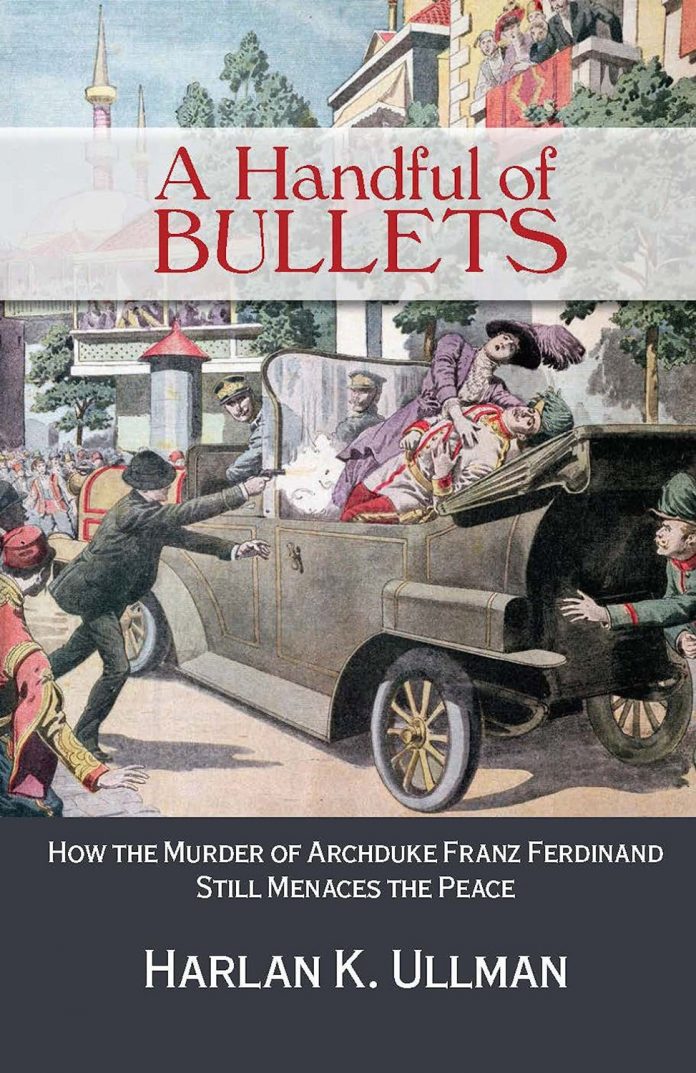
A Handful of Bullets – How the murder of Archduke Franz Ferdinand still menaces the peace
By Harlan K. Ullman. Naval Institute Press
Reviewed by Tim Coyle
THIS book’s title, and the contemporary melodramatic artistic rendition of the assassination of the heir to the Austro-Hungarian throne on the book jacket, may give the initial impression that the book is a historical treatise on the centenary of the murder that started World War I.
In using the assassination as a foundation for the book the author builds an argument by analysing the current strategic and security threats facing the world. He argues that that ‘archdukes’ and ‘bullets’ metaphorically abound in today’s security environment.
Although the book is written very much from a critical viewpoint focussed on the US, the author’s observations and analyses can readily be extracted and applied to allied governments, particularly those that have supported the US in wars and contingencies since World War II.
Ullman argues that since the assassination of Franz Ferdinand we have seen the demise of the Westphalian nation state system which provided peace, stability and prosperity as a bulwark against violence, chaos and disruption. Today’s international order is a legacy of the post-World War II era and the Cold War. The international organisations which emerged (the UN, IMF, World Bank, NATO, G20 etc) have not offset the need for a 21st century international order and structure. These organisations’ limitations and failures are sourced to Ullman’s other main tenet; that of the ‘Four Horsemen’ now roaming the world causing disruption and destruction.
Using the biblical concept of the Four Horsemen of the Apocalypse, Ullman’s four horsemen are failed or failing governments, economic decline, disparity and dislocation and violent ideologies. The major threats have been shifted from state-centric, nation-versus-nation politics and conflicts to more discrete dangers. Although state-to-state threats still exist (Ukraine, China-Japan, North Korea, India-Pakistan etc), the ubiquitous extremist ‘non-state actors’ have risen through the diffusion of power brought by globalisation and failed military interventions leading to the fragmentation of national boundaries including the arbitrary delineation of Middle East boundaries after World War I, particularly Iraq and Syria.
Ullman claims that 20th century concepts are no longer applicable to today’s threats; however, the most difficult challenge is for governments to overcome obsolete thinking and embrace new strategies to counter contemporary threats.
Ullman classes the US as one of the failing governments. He illustrates his argument by outlining the perspectives that existed in the White House in 1914, 1954 and 2014. His review of these critical years, as faced by the respective US presidents, is the basis for his criticism of the inability of the US system to adapt to contemporary threats. That US presidents come to office largely without experience is a major defect in the US system, according to Ullman. This observation may equally apply to other western democracies as there is no apprenticeship or formal training program for presidents or prime ministers. Under the Westminster system a prime minister could have served for many years in parliament – in opposition and in government as a minister – so when he or she achieves the leadership the person may be said to be experienced.
However, leadership imposes its own unique responsibilities and stresses. Unless the prime minister or president can thoughtfully assimilate the vast quantities of advice, whether prescient or superficial, and have the ability to turn advice into ideology-free policy, he or she is fated to react precipitately in response rather than plan strategically.
The US has not won any war it has been involved in, since 1945, says Ullman. It has focussed on winning battles, not wars. Its intervention in Vietnam, Iraq and Afghanistan failed to answer the question ‘what next’ or, as some would say, led to ‘mission creep’. Today’s Western coalition counterinsurgency operations use state-of-the-art ground, air and maritime assets against rag-tag groups with no armies or air forces, but engage in ruthless asymmetric warfare; their motivation and origins having emerged from the failures of previous interventions, arguably going back to the archduke’s assassination.
The counter to contemporary threats is good strategic analysis and imaginative preventive measures to obviate further four horsemen deprivations. Ullman offers his solutions but it is up to the reader to decide for him/herself whether to agree with him or to formulate their own solutions.
Regardless, this is a most useful treatise of contemporary threats (it is current up to late 2014) and the so far unsuccessful efforts to stem the assaults of the four horsemen. While centred on US policy shortfalls, the book should nevertheless be read by aspiring strategists, diplomats and military thinkers; not necessarily to agree with Ullman, but to assess where the archduke’s assassination has taken us in the past century and how we can visualise and articulate a more stable and peaceful future.



